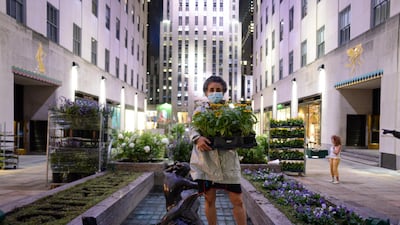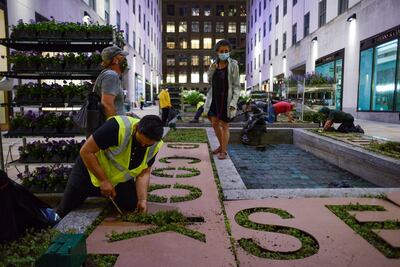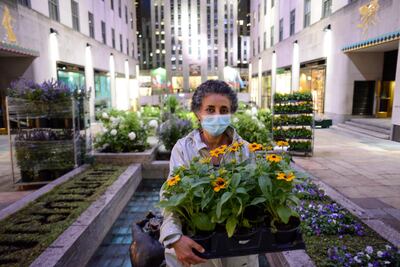How would you describe a woman? It's a contentious question full of complexities, with a million different answers under the sun.
And that's not only a turn of phrase: notions of women's qualities are now spelt out in flowers at the Rockefeller Centre, the famed Art Deco complex in New York City. Ghada Amer, an Egyptian-French artist who has been addressing the power and guises of femininity since the 1990s, created the garden by conducting informal polls around the question and selecting the most popular responses.
Arrayed in the middle of the building's esplanade as part of the Frieze Sculpture programme, are Women's Qualities: "resilient", "beautiful", "kind". One long row, in purple flowers, reads "good cook".
The terms form a beguilingly pretty, crowd-sourced portrait of what people understand a woman to be – a snapshot of attitudes in 2020, over which the coronavirus casts its shadow. Though conceived well before the pandemic struck, the project grew more complex as Amer was forced to shift her methods during New York's lockdown.
Confined to her apartment, she was unable to ask random passers-by and acquaintances about their take on women's qualities, and ended up posing her questions to three distinct demographic groups: an Egyptian circle of friends she was chatting to online; Mexican immigrants in the US, who were constructing the garden at the Rockefeller Centre and white Americans, who by and large, she says, constitute the art community in New York.

These cultural differences, privileges and aspirations are latent in the final landscape, known to Amer but hidden to the world because of her decision to choose the top terms.
Although the answers were broadly the same across all groups, the artist says there were a few cultural weightings.
"Of course 'good cook' – that was Egyptian," she says, laughing. "And Mexican, too."
The responses given by white Americans, she adds, seem to have been influenced by the #MeToo movement. She says they created an impression of a "wonder woman" that she couldn't imagine existing in reality.
Frieze Sculpture's Women's Qualities reprises a garden Amer planted 20 years ago for the Metropolitan Museum of Busan, in South Korea, which likewise formed an image of local attitudes. She spoke to local Koreans to gauge their impressions of the female ideal. The answers included "docile", "sweet" and "long-lashed", which she spelt out in Korean in hedges around the museum. She also added one term: "intelligent", which none of her respondents suggested.
As much as its portrait of popular conceptions, the form of the garden itself is important to Amer's project. She first came to prominence with her embroidered paintings of women, often in seductive poses. These challenged traditional notions of femininity, both in the West and the Middle East, and they remain her best-known works. But she has also long been working in landscaping, starting with a garden in 1999 for the acclaimed Site Santa Fe Biennial.
Gardening as high art
The idea for gardens came from the same set of concerns as her embroidery: the elevation of a creative form belittled as "craft", "applied art", or – simply, and tellingly – "women's work" to the realm of biennials, museums, and high art.
"I thought, what would a woman do if she was outside – not embroidering? She would garden," Amer says, because gardens allow the natural world to come into focus. "Why should we put a big sculpture of metal into a beautiful landscape? Although I like sculpture, the landscape is so much more beautiful than the object and will always be more powerful."
Moreover, gardening was not simply a pastime. It was an important skill set that women drew upon as caretakers of their families. In the initial plans for Women's Qualities, Amer had wanted to use medicinal plants, with which women would have once treated illnesses and ailments.
Using herbs was labelled "witchcraft", Amer says, after pharmaceutical medicines were developed. Doctors "forbid all of the medicine with plants. They were fighting many women, who had been in the fields for centuries."
This valence had to be dropped from the final piece.
Frieze Sculpture was first meant to run alongside the Frieze New York art fair in May, which was held virtually because of the coronavirus. Its public programmes were postponed, and by the time it opened, last Tuesday, it was too cold for the herbaceous plants Amer had wanted.
She holds on to the idea, however, for a future project – that will also feature a fountain, which Amer describes as her dream garden.
Her father was a diplomat, and the family lived in places across Africa and the Middle East, before settling in the south of France. While in Iraq, she recalls, her father would take her and her three sisters to a fountain in the evening.
“For me it was magical,” she says. “There would be music, and the water would change. It was amazing. It was probably a fountain just next door, or around the corner, but when you're a kid, everything is magical.”
Frieze Sculpture, curated by Brett Littman, is on view at the Rockefeller Centre in New York until Friday, October 2




